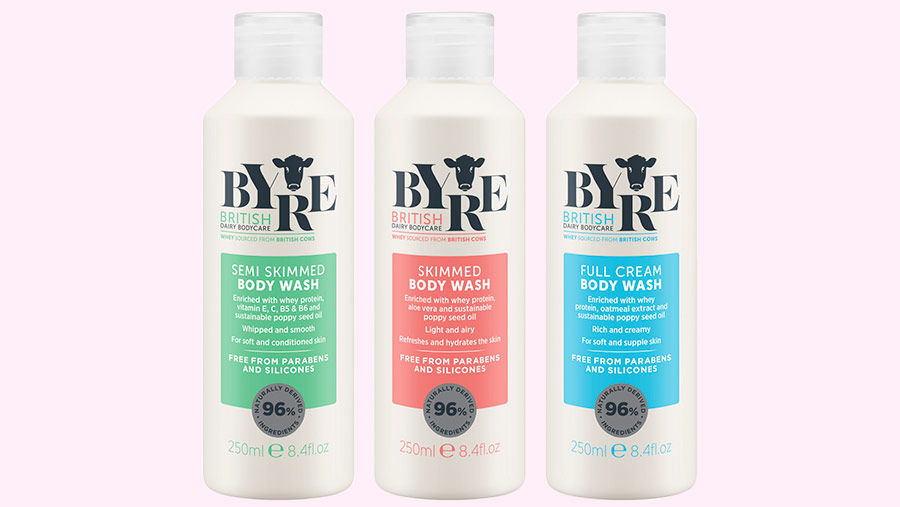Waste whey from British dairy farms turned into bodywash

A new range of luxury bodywashes that use a natural by-product of British milk and cheese production has been launched, helping cut down on waste in the dairy sector.
The three new bodywash products – full cream, semi-skimmed and skimmed – use sweet whey powder sourced from British dairy cows and a percentage of sales is being donated to farming charity the Royal Agricultural Benevolent Institution (Rabi).
Launched by Byre Bodycare, these delightfully dairy-based smellies use surplus whey as a nutritious, staple ingredient to leave skin looking as radiant as the beautiful British bovines that produced it.
See also: Doorstep milk round revived by Manchester dairy farm selling direct
Each year the dairy industry wastes an estimated 870,000t of whey.
The company sources the whey for use in its products either as raw milk from about 200 British Red Tractor Farm Assured suppliers or as whey concentrate from these same farms.
Byre Bodycare’s managing director Quentin Higham says he was inspired by his late grandfather, who was a tenant dairy farmer in Yorkshire, in developing this new range of products.
“We were brought up on the adage of ‘waste not, want not’, and I knew that whey is a waste product for most dairy farmers,” says Quentin.
“I also knew that once whey has been transformed into a powder, its high protein content meant that it could be used as an active ingredient in bath and bodycare products, due to its nourishing benefits.
“So, once I could guarantee that the source of the whey powder was from British cows, I formulated a range of products, called Byre, which is what we used to call a cowshed when I was growing up.”
Giving back
A by-product of cheese manufacturing, whey is the liquid leftover after the cheese has been curdled and strained.
The whey is concentrated by evaporating the water, increasing the total solid from 20% to about 50%.
The whey is then mixed with sustainable poppy seed oil – from a farm near Winchester – water, aloe vera, vitamins and natural extracts, to create a creamy formulation.
Quentin says he was keen to donate a portion of his products’ sales to a charity that helps farming families in tough times.
“Over the past five years, as a result of consumers wanting/expecting cheap milk, more than 1,000 dairy farms have closed, which has resulted in a lot of farming people facing hardship.
“If my grandfather had been alive today, he may well have been one of those farmers who has lost their livelihoods.
“So, in memory of him, I wanted to make a donation of net sales to a charity that looks after farming families facing adversity, which is exactly what the Rabi provides.”
